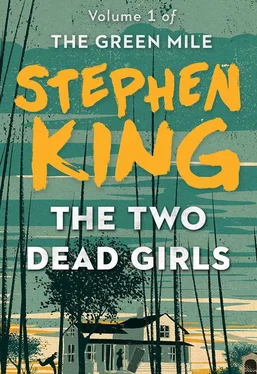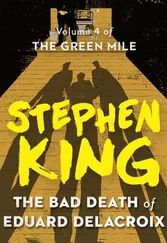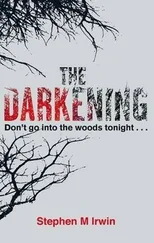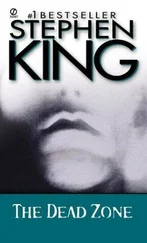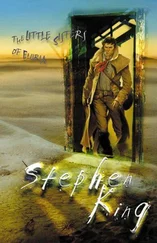Stephen King
THE GREEN MILE
VOLUME I
THE TWO DEAD GIRLS

October 27, 1995
Dear Constant Reader,
Life is a capricious business. The story which begins in this little book exists in this form because of a chance remark made by a realtor I have never met. This happened a year ago, on Long Island. Ralph Vicinanza, a longtime friend and business associate of mine (what he does mostly is to sell foreign publishing rights for books and stories), had just rented a house there. The realtor remarked that the house “looked like something out of a story by Charles Dickens.”
The remark was still on Ralph’s mind when he welcomed his first houseguest, British publisher Malcolm Edwards. He repeated it to Edwards, and they began chatting about Dickens. Edwards mentioned that Dickens had published many of his novels in installments, either folded into magazines or by themselves as chapbooks (I don’t know the origin of this word, meaning a smaller-than-average book, but have always loved its air of intimacy and friendliness). Some of the novels, Edwards added, were actually written and revised in the shadow of publication; Charles Dickens was one novelist apparently not afraid of a deadline.
Dickens’s serialized novels were immensely popular; so popular, in fact, that one of them precipitated a tragedy in Baltimore. A large group of Dickens fans crowded onto a waterfront dock, anticipating the arrival of an English ship with copies of the final installment of The Old Curiosity Shop on board. According to the story, several would-be readers were jostled into the water and drowned.
I don’t think either Malcolm or Ralph wanted anyone drowned, but they were curious as to what would happen if serial publication were tried again today. Neither was immediately aware that it has happened (there really is nothing new under the sun) on at least two occasions. Tom Wolfe published the first draft of his novel Bonfire of the Vanities serially in Rolling Stone magazine, and Michael McDowell ( The Amulet, Gilded Needles, The Elementals, and the screenplay Beetlejuice ) published a novel called Blackwater in paperback installments. That novel—a horror story about a Southern family with the unpleasant familial trait of turning into alligators—was not McDowell’s best, but enjoyed good success for Avon Books, all the same.
The two men further speculated about what might happen if a writer of popular fiction were to try issuing a novel in chapbook editions today—little paperbacks that might sell for a pound or two in Britain, or perhaps three dollars in America (where most paperbacks now sell for $6.99 or $7.99). Someone like Stephen King might make an interesting go of such an experiment, Malcolm said, and from there the conversation moved on to other topics.
Ralph more or less forgot the idea, but it recurred to him in the fall of 1995, following his return from the Frankfurt Book Fair, a kind of international trade show where every day is a showdown for foreign agents like Ralph. He broached the serialization/chapbook idea to me along with a number of other matters, most of which were automatic turndowns.
The chapbook idea was not an automatic turndown, though; unlike the interview in the Japanese Playboy or the all-expenses-paid tour of the Baltic Republics, it struck a bright spark in my imagination. I don’t think that I am a modern Dickens—if such a person exists, it is probably John Irving or Salman Rushdie—but I have always loved stories told in episodes. It is a format I first encountered in The Saturday Evening Post, and I liked it because the end of each episode made the reader an almost equal participant with the writer—you had a whole week to try to figure out the next twist of the snake. Also, one read and experienced these stories more intensely, it seemed to me, because they were rationed. You couldn’t gulp, even if you wanted to (and if the story was good, you did).
Best of all, in my house we often read them aloud—my brother, David, one night, myself the next, my mother taking a turn on the third, then back to my brother again. It was a rare chance to enjoy a written work as we enjoyed the movies we went to and the TV programs ( Rawhide, Bonanza, Route 66 ) that we watched together; they were a family event. It wasn’t until years later that I discovered Dickens’s novels had been enjoyed by families of his day in much the same fashion, only their fireside agonizings over the fate of Pip and Oliver and David Copperfield went on for years instead of a couple of months (even the longest of the Post serials rarely ran much more than eight installments).
There was one other thing that I liked about the idea, an appeal that I suspect only the writer of suspense tales and spooky stories can fully appreciate: in a story which is published in installments, the writer gains an ascendancy over the reader which he or she cannot otherwise enjoy—simply put, Constant Reader, you cannot flip ahead and see how matters turn out.
I still remember walking into our living room once when I was twelve or so and seeing my mother in her favorite rocker, peeking at the end of an Agatha Christie paperback while her finger held her actual place around page 50. I was appalled, and told her so (I was twelve, remember, an age at which boys first dimly begin to realize that they know everything), suggesting that reading the end of a mystery novel before you actually get there was on a par with eating the white stuff out of the middle of Oreo cookies and then throwing the cookies themselves away. She laughed her wonderful unembarrassed laugh and said perhaps that was so, but sometimes she just couldn’t resist the temptation. Giving in to temptation was a concept I could understand; I had plenty of my own, even at twelve. But here, at last, is an amusing cure for that temptation. Until the final episode arrives in bookstores, no one is going to know how The Green Mile turns out… and that may include me.
Although there was no way he could have known it, Ralph Vicinanza mentioned the idea of a novel in installments at what was, for me, the perfect psychological moment. I had been playing with a story idea on a subject I had always suspected I would get around to sooner or later: the electric chair. “Old Sparky” has fascinated me ever since my first James Cagney movie, and the first Death Row tales I ever read (in a book called Twenty Thousand Years in Sing Sing, written by Warden Lewis E. Lawes) fired the darker side of my imagination. What, I wondered, would it be like to walk those last forty yards to the electric chair, knowing you were going to die there? What, for that matter, would it be like to be the man who had to strap the condemned in… or pull the switch? What would such a job take out of you? Even creepier, what might it add?
I had tried these basic ideas, always tentatively, on a number of different frameworks over the last twenty or thirty years. I had written one successful novella set in prison ( Rita Hayworth and Shawshank Redemption ), and had sort of come to the conclusion that that was probably it for me, when this take on the idea came along There were lots of things I liked about it, but nothing more than the narrator’s essentially decent voice; low-key, honest, perhaps a little wide-eyed, he is a Stephen King narrator if ever there was one. So I got to work, but in a tentative, stop-and-start way. Most of the second chapter was written during a rain delay at Fenway Park!
Читать дальше
